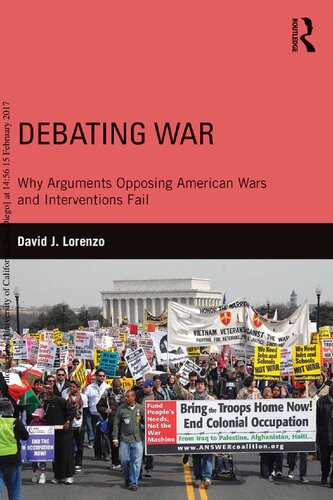

Most ebook files are in PDF format, so you can easily read them using various software such as Foxit Reader or directly on the Google Chrome browser.
Some ebook files are released by publishers in other formats such as .awz, .mobi, .epub, .fb2, etc. You may need to install specific software to read these formats on mobile/PC, such as Calibre.
Please read the tutorial at this link: https://ebookbell.com/faq
We offer FREE conversion to the popular formats you request; however, this may take some time. Therefore, right after payment, please email us, and we will try to provide the service as quickly as possible.
For some exceptional file formats or broken links (if any), please refrain from opening any disputes. Instead, email us first, and we will try to assist within a maximum of 6 hours.
EbookBell Team

4.7
106 reviewsWhat arguments have critics of American wars and interventions put forward, and what arguments do they currently employ? Thomas Jefferson, Henry Thoreau, John Calhoun, the Anti-Imperialist League, Herbert Hoover, Charles Lindbergh, Martin Luther King Jr., and Ron Paul (among others) have criticized proposals to intervene in other countries, enter wars, acquire foreign territory, and engage in a forward defense posture. Despite cogent objections, they have also generally lost the argument. Why do they lose?
This book provides answers to these questions through a survey of oppositional arguments over time, augmented by the views of contemporary critics, including those of Ron Paul, Chalmers Johnson and Noam Chomsky. Author David J. Lorenzo demonstrates how and why a significant number of arguments are dismissed as irrelevant, unpatriotic, overly pessimistic, or radically out of the mainstream. Other lines of reasoning might provide a compelling critique of wars and interventions from a wide variety of perspectives – and still lose. Evaluating oppositional arguments in detail allows the reader to understand problems likely to be faced in the context of policy discussions, to grasp important political differences and the potential for alliances among critics, and ultimately to influence decision-making and America’s place in the international power structure.